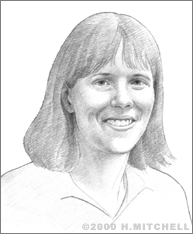Amy Smith
Working with innovative instincts and a broad world-view, Amy Smith has made a career of inventing devices that improve conditions in developing countries, including the phase-change incubator and the screenless hammermill.
Smith's first encounter with life in a developing country came about in the second grade, when her father, Arthur Smith, a Professor at the Massachusetts Institute of Technology (MIT), moved the family to northwestern India for a year. He taught at a technical institute in a small village in the Rajasthan desert, and Amy and her sisters attended a local school. Smith never forgot her experience in India. After she returned home to Lexington, Massachusetts, she would later donate half the money she earned babysitting to UNICEF.
Smith earned a SB in Mechanical Engineering at MIT in 1984. After two years dividing her time between engineering and various volunteer projects in Boston, she began a double-length assignment with the Peace Corps in Botswana. Smith trained farmers, women's groups and school groups in beekeeping, and taught math, science and English at the middle-school level. One day, staring out at the Kalahari Desert from her desk, Smith had an “epiphany,” she realized that the more she knew about engineering, the more she could help developing cultures to meet their basic needs.
In 1990, Smith returned to MIT, to put this plan into action. The thesis project for which she earned an SM in 1995 was a screenless hammermill. A hammermill is a machine that grinds grain into flour; typically, the flour is filtered out through a screen. But in developing countries, such screens often clog or break during use and cannot be manufactured locally.
Smith’s invention is simple and inexpensive to build. The grain is funneled into a circular grinding chamber; a single blade grinds the grain as it spins, and the resultant flour is separated from the unground grain aerodynamically instead of through a screen. Smith’s machine, which can be built and maintained with simple tools, can grind one kilogram of grain per minute, as opposed to the manual rate of one kilogram per hour.
Smith won a grant to field test her mill in Senegal, where it was a great success. She decided to pursue a second master’s degree at MIT, in the Technology and Policy Program, in order to become an expert in providing technology and training to the cultures in greatest need. Smith has designed a number of MIT courses in design for developing countries, and has collaborated on engineering textbooks, as well as a CD-ROM with instruction in engineering design.
Smith has also continued to invent “low tech” devices that solve basic problems. One was a response to a healthcare problem she encountered in Uganda in 1996. Smith invented a fairly inexpensive device that uses a chemical compound to keep water samples at a steady warm temperature for 24 hours, so the samples can be tested for the presence of bacteria or the effectiveness of antibiotics. Such studies were previously expensive or impossible in regions that lack electricity. For this “phase-change incubator” Smith won the 1999 BF Goodrich Collegiate Inventors Award.
Amy Smith won the 2000 Lemelson-MIT Student Prize for Inventiveness. Unlike most inventors, Smith wants her inventions to be adopted as broadly and inexpensively as possible, rather than controlling them through patents. So it should come as no surprise that Smith used her $30,000 prize money to fund the field testing and distribution of her hammermill and incubator in the African countries that need them.
Smith continues to lead with her inventiveness and passion for improving the lives in developing countries through programs and teaching at MIT. She has been an instructor at MIT's Edgerton Center, a program that provides project-oriented learning experiences in engineering and science for MIT undergraduates and local 4th – 8th grade school groups since 2000. In 2001, Smith and Sally Susnowitz—assistant dean and director of MIT’s Public Service Center—co-developed the IDEAS Competition, which encourages teams to develop and implement projects that make a positive change in the world. Smith also founded the International Development Initiative (IDI) that enables MIT students to gain hands-on engineering education and community service experience through international development projects.
Smith is also founder, co-director and instructor for D-Lab, a series of courses and field trips that focus on international development, appropriate technologies, and sustainable solutions for communities in developing countries. In 2004 she was awarded a MacArthur Fellowship for creating technologies that improve lives in the developing world and inspiring students to do the same.


